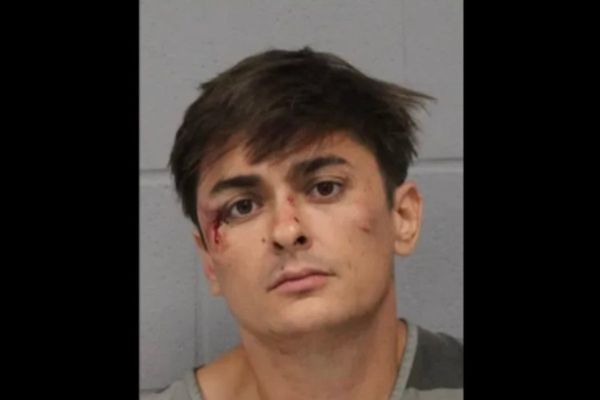
Rick Grimes, the zombie-killing police officer of Walking Dead fame played by British actor Andrew Lincoln, will find himself in a dangerous predicament when the new season of the hit series is broadcast on Sunday.
His immediate survival problem is no longer an army of decomposing zombies, but a rival gang called the Saviors, led by the sinister character named Negan, who has captured Grimes and his extended family and is now threatening to kill them with a baseball bat wrapped in barbed wire.
For the AMC cable and satellite channel, the show has been a consistent ratings smash, at one time beating everything in broadcast and cable in the valuable 18-49 age group. The trade publication Variety calls it TV’s “most improbable mega-hit”, and a show “so bleak it practically thumbs its nose at mass appeal”. Think of it as The Waltons with putrescence.
At the centre of the action is the Rada-trained Lincoln, 43, who began his career in the BBC drama This Life, followed by roles such as Simon in the Channel 4 sitcom Teachers and Mark in the romantic comedy film Love Actually.
Like other British actors, including Dominic West in The Wire and The Affair, and Damian Lewis in Band of Brothers and Homeland, Lincoln has so effectively disguised his Britishness that his success, it could be argued, has nothing to do with trading on being British in America – an attribute that has in any case been taking a post-Brexit beating.
But the fact that The Walking Dead hasn’t produced any breakout stars makes its success all the more improbable although it has been a friend to British actors, including David Morrissey as the mass-murdering governor, and Lennie James as the Zen-master Morgan.
“There are lots of theories about zombies but in the end the shows that become successful don’t have so much to do with genre or subject material, but just that they’re really well executed,” says Robert Thompson, director of the Bleier center for television and popular culture at Syracuse University. “That’s true for The Walking Dead. It’s lushly produced, it’s got a lot of interesting characters, it’s graphically violent and they use the whole zombie metaphor to mean virtually anything.”
The Walking Dead’s success is partly due to the fact that it doesn’t depend on its lead actors being the star attractions, or on celebrity power, sexual tension, or indeed, any effort to combat a virus that has turned people into zombies. In The Walking Dead the world is hardly aspirational. And in the new series, the world no longer belongs to Rick. It belongs to Negan (Jeffrey Dean Morgan, last seen in The Good Wife).
“We are seven years in and we are only unleashing now probably the greatest villain of the series,” Lincoln said. “It’s a very thrilling and exciting time. It feels like we are smashing everything and starting over. There’s going to be a lot more dark, very funny twisted humour in this show and that will be a great new palette to explore.”

While the non-stardom approach has worked for Lincoln, it’s less suited to Benedict Cumberbatch, whose latest Marvel-derived film Doctor Strange, about a neurosurgeon who loses the use of his hands and goes on a pilgrimage to the east where he discovers magic, opens on Tuesday in the UK and 4 November in the US. Cumberbatch, subject of a recent Vanity Fair cover story, told reporters last week it wasn’t until he donned the red cape known as the “cloak of levitation” that he realised he would forever be associated with Doctor Strange.
Cumberbatch – unlike the zombie-slaying Lincoln, who will appear at a Walking Dead festival in Atlanta, Georgia, this week – has taken a more conventional approach to movie stardom. “Perhaps it’s his accentuated Britishness – that Dickensian name, that Brontëan pallor – that renders him a kind of imaginary dress-up doll, a thinking woman’s fetish object,” gushed Vanity Fair. “A good chunk of the web is now devoted to Cumbergazing, or Cumberfantasizing, or straight-up Cumberstalking.”
Thompson detects a subtle shift in expectation of what audiences expect from British actors. “In the last couple of decades we’ve had a lot of actors coming through, like West or Hugh Laurie in House, where audiences experience a kind of cognitive dissonance when they speak in English English.”
West’s national identity was irrelevant to The Wire, just as Laurie’s was to House. That what we’re talking about here, too. That’s very different from, say, Hugh Grant, who became almost a self-parody of America’s idea of a charming Brit. These new actors aren’t so much an antidote to the stereotypes, they’re just actors who aren’t playing those types of roles.”
None of which should be troubling to Lincoln. Earlier this year, after fans complained about a conventional, cliff-hanger finale to season 6, Lincoln said he has begun to realise that a “symbiotic relationship” exists between the show and the fanbase.
“We’re just a small part of a much bigger conversation online,” he told Entertainment Weekly. “And far be it for me to say someone’s right or wrong. I love the fact that everybody is so engaged with it and so opinionated about it. I think it’s a great energy that we feed off... we value and respect everybody’s opinion because without it we wouldn’t be here.”
Dr Steven Schlozman, author of the spoof medical manual The Zombie Autopsies, said he believes zombie fans “get legitimately drawn into what can only be called a kind of zombie verisimilitude. It’s one thing to ponder Gary Cooper’s dilemmas in High Noon. Those are real and believable bad guys. But in The Walking Dead, we’re talking zombies, and still I’ve had colleagues at work who think out loud during lunch about how they would handle the messy ambiguities that zombies bring to the table.”
Fighting zombies, in other words, doesn’t conform to conventional demands. Any attempt to make zombies fast-moving, cunning or dexterous is to tempt disaster. “Make zombies move as if they are plodding through molasses,” Schlozman advised The Walking Dead series. “Make them walking metaphors for the sticky decisions that the humans among them must face. That’ll keep the show going for a long, long time.”







